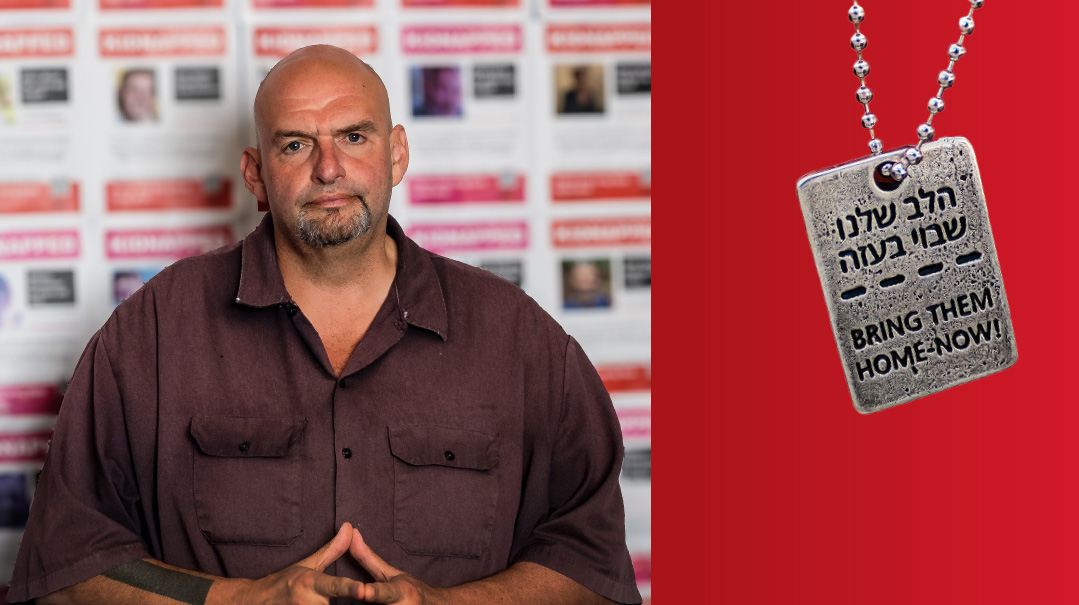Pittsburgh Steel: Senator John Fetterman Stands Tall as Israel’s Ironclad Defender

An hour’s conversation showed that Fetterman is an enigma only insofar as to what triggered his journey

Photos: Eli Greengart, AP images, Yeshiva University, and Mishpacha archives
In the moral morass of post-October 7 politics, as American lawmakers were silenced by the mob baying for Israel’s blood, one politician stood tall. At 6’8”, John Fetterman, the once progressive junior senator from Pennsylvania, has emerged as a man of steely conviction in a party whose left flank has moved to embrace the Hamas narrative, a surprising yet steadfast defender of the Jewish state in its darkest hour
IF Senator John Fetterman had a dollar for every time he’s been asked the question since October 7, he’d collect multiples of the $150 annual salary he once drew as mayor.
Pennsylvania’s junior senator was towering over the aisles of a Pittsburgh store a few weeks ago when a man came over to introduce himself.
“Hi, I’m Jewish, and I want to thank you for standing with Israel through all of this,” he said. “What I don’t understand is why you do it — do you have some kind of Jewish roots?”
From the moment he stood draped in an Israeli flag at the rally for Israel in Washington, D.C., last November, fathoming Fetterman has practically become a Jewish parlor game. Is Fetterman a Jewish name? Can Jews even grow to six feet, eight inches? How did a one-time progressive become such a fierce advocate for Israel?
If the question betrays the widespread post-October 7 sense of Jewish isolation, Fetterman’s lack of comprehension when asked about his Israel support says a lot about the man himself.
“A different kind of Democrat,” read the blurb on John Fetterman’s now-defunct 2022 campaign website. “John doesn’t look like a typical politician, and more importantly, he doesn’t act like one.”
Rarely in the long, mendacious annals of political PR has a truer statement been made. Fetterman is not just “not your average politician.” He seems utterly allergic to politics as usual.
Dispense with the externals — the shaven head, hulking height, and uniform of hoodie and cargo shorts — that make him stand out in the august upper chamber. Those are just the inevitable clichés that dot Fetterman-land.
It’s what John Fetterman has done since being elected as the Commonwealth’s junior senator in 2023 that has confounded the entire political spectrum. The man assumed by both left and right to be a card-carrying progressive has emerged as a force of nature in his moral convictions. The crucible for that transformation, at least in public terms, has been the Gaza war.
“I forcefully condemn these cowardly, horrifying, unprovoked attacks on Israel by Hamas,” he tweeted on October 7 — and ever since, he’s stood rock-like by Israel’s side. Even as many of his colleagues were silenced by the mob baying for Israel’s blood, he refused to abandon an American ally facing an existential threat.
He’s turned out to demonstrate with the Pittsburgh Jewish community, trolled progressives by waving an Israel flag from the roof of his home, turned his Senate office into a shrine to the hostages held by Hamas, and given no quarter to the leader of his own party for delaying arms shipments to Israel.
In turn, he’s been vilified by progressives furious at his betrayal, and left so isolated in his own party that he didn’t even attend last month’s Democratic National Convention.
Along with much of a press corps intrigued by Fetterman’s emergence as a fearless ally of Israel, I chased the senator for an interview for the best part of a year. A proposed sit-down interview didn’t pan out in DC or in Israel, but eventually took place remotely. The senator sat in his industrial-style home opposite the steel plant that anchors Braddock, a Pittsburgh borough. I sat in Kibbutz Ein Gedi, trying to understand a man whose choice to support Israel — a place he first visited three months ago — has puzzled many.
An hour’s conversation showed that Fetterman is an enigma only insofar as to what triggered his journey. Was it something that he somehow absorbed from home? Was it a reaction to the near-fatal stroke that he underwent when running for Senate, that somehow freed him to speak his mind?
Whatever the cause, the end result is unmistakable: John Fetterman is a liberal mugged by the vicious reality of his party’s activist left. He’s emerged as a convert to old-fashioned Democratic centrism, inviting comparisons to such Senate legends as Henry “Scoop” Jackson and Hawaii’s Daniel Inouye — Cold Warriors and Democrats who fiercely defended Israel. In a sign of Fetterman’s signature independence, his evolution comes just when that orientation was falling out of favor — and just when Israel needed it most.
Oops! We could not locate your form.







